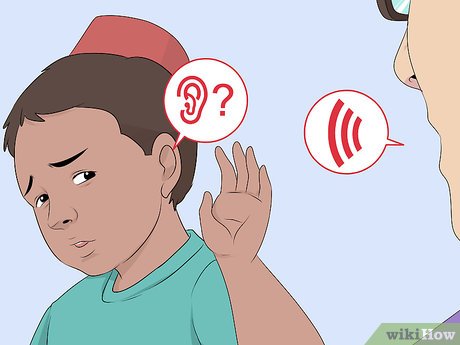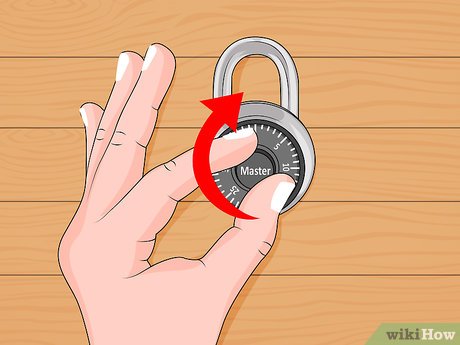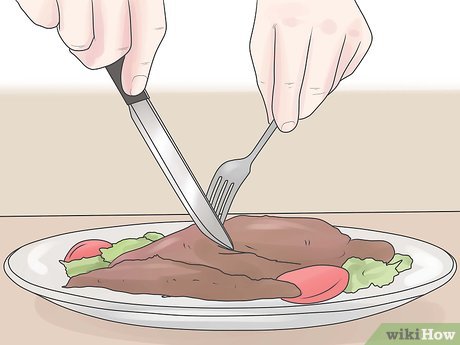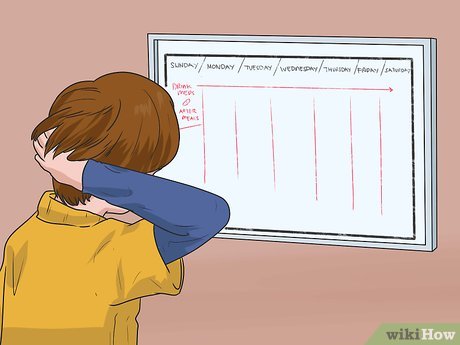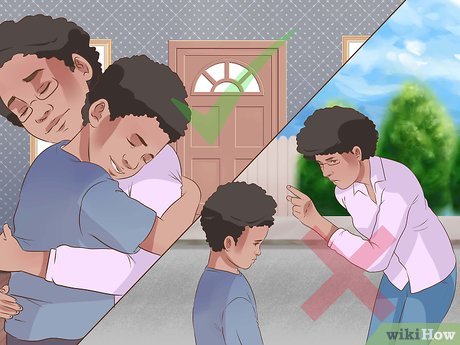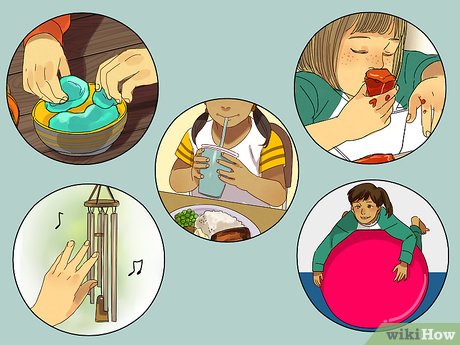How to Help Your Child with Prader‐Willi Syndrome
Part 1 of 6:
After the Diagnosis
-
 Educate yourself about Prader Will Syndrome (PWS). Read online articles and books, watch documentaries such as "My Deadly Appetite" on YouTube.
Educate yourself about Prader Will Syndrome (PWS). Read online articles and books, watch documentaries such as "My Deadly Appetite" on YouTube.- Don't let your fears take over.[1] Kids with PWS can have happy lives. While they will face extra challenges, they can also have a lot of fun.[2][3][4]
-
 Get support from your family and community. Helping your child build their motor skills and cope with constant hunger will be challenging. It's hard to see your child struggling, and it's okay to feel stressed or sad at times. Reach out to other people for support.
Get support from your family and community. Helping your child build their motor skills and cope with constant hunger will be challenging. It's hard to see your child struggling, and it's okay to feel stressed or sad at times. Reach out to other people for support. -
 Don't worry too much about dire predictions. Kids with PWS can surprise their families by doing more than was believed possible.[5] While your child probably won't be able to live independently, they can still lead full lives.
Don't worry too much about dire predictions. Kids with PWS can surprise their families by doing more than was believed possible.[5] While your child probably won't be able to live independently, they can still lead full lives. -
 Take some "me time." All parents need time to themselves. Make sure you are getting enough time to relax. See if you can get a babysitter or a respite care provider to take over for a while.
Take some "me time." All parents need time to themselves. Make sure you are getting enough time to relax. See if you can get a babysitter or a respite care provider to take over for a while.- Relaxation is especially important for parents of kids with PWS, because kids with PWS thrive in a calm environment. Thus, you should never feel guilty about taking some time off. Your calmness helps your child.
-
 Get resources at school and home. Your child may be eligible for programs that offer free or subsidized therapy. At school, your child may be able to get an aide or attend special education.
Get resources at school and home. Your child may be eligible for programs that offer free or subsidized therapy. At school, your child may be able to get an aide or attend special education.
Part 2 of 6:
Understanding Your Child
-
 Imagine what it would be like to be hungry all the time. The next time you feel hungry, stop and imagine what it would be like to live with constant hunger. Think about how hunger can cause you to be angry, stressed, or impatient. Now imagine that you could never fix it. This is what people with PWS live with every day.
Imagine what it would be like to be hungry all the time. The next time you feel hungry, stop and imagine what it would be like to live with constant hunger. Think about how hunger can cause you to be angry, stressed, or impatient. Now imagine that you could never fix it. This is what people with PWS live with every day.- If your health allows it, try going an afternoon without food just to help you better understand what it feels like for your child all the time. (Stop and eat if you start to get serious side effects, like dizziness or difficulty driving.)
-
 Keep in mind that anxiety can be a serious issue for people with PWS. Your child may often feel nervous or afraid. In some cases, the anxiety can be severe. They'll thrive best in a low-stress environment with patient and understanding people.
Keep in mind that anxiety can be a serious issue for people with PWS. Your child may often feel nervous or afraid. In some cases, the anxiety can be severe. They'll thrive best in a low-stress environment with patient and understanding people. -
 Recognize literal thinking. People with PWS tend to think concretely, and they may not understand metaphors or figurative language. Thus, it's better to use language that's easy to understand.
Recognize literal thinking. People with PWS tend to think concretely, and they may not understand metaphors or figurative language. Thus, it's better to use language that's easy to understand. -
 Be aware of differences in memory. People with PWS typically have poor short-term memory and excellent long-term memory.[6] Your child may be forgetful, so be patient with them. Don't be afraid to give reminders and repeat yourself. The good news is that once they learn something, they'll probably never forget.
Be aware of differences in memory. People with PWS typically have poor short-term memory and excellent long-term memory.[6] Your child may be forgetful, so be patient with them. Don't be afraid to give reminders and repeat yourself. The good news is that once they learn something, they'll probably never forget.- People with PWS tend to misremember events.[7] Instead of assuming that your child is lying, keep in mind that they may just be confused.
-
 Keep sleepiness in mind. People with PWS can be tired during the day. They may need naps or just understanding from caregivers. Don't push your child too hard if they seem sleepy.
Keep sleepiness in mind. People with PWS can be tired during the day. They may need naps or just understanding from caregivers. Don't push your child too hard if they seem sleepy. -
 Notice difficulties with auditory processing. People with PWS typically also have auditory processing disorder, a condition that makes it harder to understand the words they hear. Expect a 3-5 second delay for them to understand what you just said. Here are some ways you can help:[8]
Notice difficulties with auditory processing. People with PWS typically also have auditory processing disorder, a condition that makes it harder to understand the words they hear. Expect a 3-5 second delay for them to understand what you just said. Here are some ways you can help:[8]- Give them a few seconds to think before expecting them to follow directions.
- Break big tasks into smaller parts. For example, instead of "get ready for bed," say "it's pyjama time," and then tell them the next step.
- Speak clearly, and be willing to repeat yourself if they don't understand you the first time.
-
 Understand differences in sensory processing. Some of their senses may be under-sensitive, while others are over-sensitive. Your child may seek sensory input sometimes, and they may find certain types of sensory input to be physically painful. Be understanding, and consider getting support from an occupational therapist who specializes in sensory integration.
Understand differences in sensory processing. Some of their senses may be under-sensitive, while others are over-sensitive. Your child may seek sensory input sometimes, and they may find certain types of sensory input to be physically painful. Be understanding, and consider getting support from an occupational therapist who specializes in sensory integration.- Encourage outdoor play to provide sensory activities.
- Look for sensory toys they might enjoy. Notice the types of things they gravitate towards (like musical toys or soft textures) and purchase toys accordingly.
Part 3 of 6:
Handling Their Appetite
-
 Talk about their hunger. It's difficult to cope with constant hunger, and your child will naturally feel upset. Do your best to empathize and reassure them. Explain to them that eating too much can make them very sick.
Talk about their hunger. It's difficult to cope with constant hunger, and your child will naturally feel upset. Do your best to empathize and reassure them. Explain to them that eating too much can make them very sick.- Your child may wonder why they have to follow rules that others don't. You might tell them that they have a "special tummy" or a "health problem."[9]
-
 Serve small portions. Kids with PWS need fewer calories than the average child. They may eat only half of what a typical kid would eat in order to maintain their weight. Try serving food on a smaller plate so that it looks like a bigger amount.
Serve small portions. Kids with PWS need fewer calories than the average child. They may eat only half of what a typical kid would eat in order to maintain their weight. Try serving food on a smaller plate so that it looks like a bigger amount.- You can also schedule 2 or 3 snacks per day.
-
 Opt for healthy, low-fat foods. Kids with PWS have very slow metabolisms. They need to eat mainly low-fat foods like fruits, vegetables, and whole grains. Dessert should be a rare occasion, not an everyday one.
Opt for healthy, low-fat foods. Kids with PWS have very slow metabolisms. They need to eat mainly low-fat foods like fruits, vegetables, and whole grains. Dessert should be a rare occasion, not an everyday one. -
 Secure food. Lock up all food and edible garbage. They should not be able to access food without supervision. Unfortunately, kids with PWS can literally eat themselves to death, so restricting access to food is necessary to keep them safe.
Secure food. Lock up all food and edible garbage. They should not be able to access food without supervision. Unfortunately, kids with PWS can literally eat themselves to death, so restricting access to food is necessary to keep them safe.- Consider storing all food in a separate room (e.g. the laundry room or a pantry).
-
 Try creating a picture schedule for meals. Kids with PWS can obsess over food due to extreme hunger, and they may constantly wonder when they can next eat and what the food will be.[10] Consider putting in a picture schedule with pictures of what they will eat (e.g. crackers or a salad) with the time of the meal or snack written below it.
Try creating a picture schedule for meals. Kids with PWS can obsess over food due to extreme hunger, and they may constantly wonder when they can next eat and what the food will be.[10] Consider putting in a picture schedule with pictures of what they will eat (e.g. crackers or a salad) with the time of the meal or snack written below it.- Try using picture cards that you can exchange.
- Hang the picture schedule in a room where your child likes to spend time.
-
 Wait out tantrums, whining, and begging over food. Your child may act out due to distress from hunger. Do your best to stay patient and empathetic, even when you feel annoyed. Here are some things you can say:
Wait out tantrums, whining, and begging over food. Your child may act out due to distress from hunger. Do your best to stay patient and empathetic, even when you feel annoyed. Here are some things you can say:- "I know you're upset. It's okay to be unhappy, but the rules won't change just because you don't like them."
- "I know you're hungry, but that doesn't make it okay to steal food from other children."
- "Go ahead and let it all out. I'm right here, and I love you."
-
 Cut food into small pieces. People with PWS may try to eat too-large bites, putting them at risk of choking.[11] Remind your child to take small bites to stay safe, and assure them that they can eat everything on their plate.
Cut food into small pieces. People with PWS may try to eat too-large bites, putting them at risk of choking.[11] Remind your child to take small bites to stay safe, and assure them that they can eat everything on their plate. -
 Plan for how to handle restaurants. Your child may try to take more food than is appropriate. You may prefer to get takeout, or take the food outdoors to avoid public arguments.
Plan for how to handle restaurants. Your child may try to take more food than is appropriate. You may prefer to get takeout, or take the food outdoors to avoid public arguments.
Part 4 of 6:
Reducing Stress
People with PWS can struggle with severe anxiety, and this can cause them to act out. Stress reduction makes life easier for the child and the family.
-
 Speak calmly. People with PWS can be very reactive, and they thrive best in a calm environment with calm people. Work on controlling your tone and responding gently, even when things are emotionally charged. Showing calm and compassion can make a big difference.[12]
Speak calmly. People with PWS can be very reactive, and they thrive best in a calm environment with calm people. Work on controlling your tone and responding gently, even when things are emotionally charged. Showing calm and compassion can make a big difference.[12]- Act calmly, even if you're stressed inside.
- Ignore annoying or troublesome behavior, and then pay attention to them as soon as they stop.
- Refuse to engage in power struggles. Say "You can have this, or you can have nothing."
-
 Stick to a routine. Kids with PWS feel most comfortable in a structured, predictable daily routine.[13][14] Try serving the same meals to your child each day, and following a routine. You can use a picture schedule to help remind the child of the routine, and to give them advance notice of schedule changes.
Stick to a routine. Kids with PWS feel most comfortable in a structured, predictable daily routine.[13][14] Try serving the same meals to your child each day, and following a routine. You can use a picture schedule to help remind the child of the routine, and to give them advance notice of schedule changes. -
 Schedule at least 30 minutes of exercise per day. In addition to helping burn calories, exercise is excellent for stress reduction. Find activities that your child likes, from martial arts to swimming.
Schedule at least 30 minutes of exercise per day. In addition to helping burn calories, exercise is excellent for stress reduction. Find activities that your child likes, from martial arts to swimming. -
 Try visiting parks and community centers. You may have a local YMCA, pool, or gym for kids where you can take your child. Look at ways to get your child out in the community while staying active.
Try visiting parks and community centers. You may have a local YMCA, pool, or gym for kids where you can take your child. Look at ways to get your child out in the community while staying active. -
 Encourage time spent outdoors. Playing outside is healthy for children. Try to get them outside every day if the weather allows.
Encourage time spent outdoors. Playing outside is healthy for children. Try to get them outside every day if the weather allows. -
 Speak clearly, and mean what you say. Kids with PWS are literal thinkers, and they need things to be clear. Don't leave any ambiguity. Here are some things to do:[15]
Speak clearly, and mean what you say. Kids with PWS are literal thinkers, and they need things to be clear. Don't leave any ambiguity. Here are some things to do:[15]- Don't make idle threats if you won't follow through.
- Keep the rules clear and consistent.
- Don't say unclear things like "Maybe later" or "We'll see." Uncertainty can cause anxiety.
-
 Offer choices. Let the child choose between 2 equally good options.[16] This supports their autonomy and helps them feel like they have a bit of control over their lives.
Offer choices. Let the child choose between 2 equally good options.[16] This supports their autonomy and helps them feel like they have a bit of control over their lives.- "Would you like to wear the blue shirt or the green one?"
- "Would you like to shower now or after dinner?"
-
 Give positive feedback. Positive reinforcement can help boost a child's confidence and reassure them that they're succeeding. Positive reinforcement can be particularly effective for helping kids with PWS.[17]
Give positive feedback. Positive reinforcement can help boost a child's confidence and reassure them that they're succeeding. Positive reinforcement can be particularly effective for helping kids with PWS.[17] -
 Share positive experiences. Don't forget to have fun with your child. Play games, chat, sing, dance, and do fun things together. Try to get quality time with your child every day if possible.
Share positive experiences. Don't forget to have fun with your child. Play games, chat, sing, dance, and do fun things together. Try to get quality time with your child every day if possible.
Part 5 of 6:
Helping with Emotion Regulation
Regulating emotions is a challenge for people with PWS,[18] so your child will need extra support to help them learn to cope with strong emotions.
-
 Help them label their emotions. Labeling emotions can help them understand their feelings, and is the first step towards coping. Young children may have limited emotional language, and you can help them learn by talking about emotions.
Help them label their emotions. Labeling emotions can help them understand their feelings, and is the first step towards coping. Young children may have limited emotional language, and you can help them learn by talking about emotions.- "Your face is all scrunched up and you're stomping your feet. You look angry."
- "Look at you, bouncing and giggling like that! You're so excited!"
- "Are you sad?"
- "Do you feel overwhelmed right now? We can take a break."
- "I've noticed that you normally rub your hands like that when you feel worried. Would you like to tell me what's wrong?"
-
 Talk about your own emotions, and the emotions of other people. Talk about the feelings of characters in books and TV shows, and the feelings of people in real life. Help label the feelings and talk about them. This can help improve your child's emotional awareness.
Talk about your own emotions, and the emotions of other people. Talk about the feelings of characters in books and TV shows, and the feelings of people in real life. Help label the feelings and talk about them. This can help improve your child's emotional awareness.- "Your sister is frowning. I think she's sad."
- "I feel so frustrated right now! Maybe I need to take some deep breaths."
- "How do you think the kitty felt when the doggy didn't invite him to her party?"
- "Oh, look at Mr. Puddle's face. I think he's scared. What do you think Mr. Puddle can do when he feels scared?"
-
 Validate their feelings. Coping with big emotions can be tough for kids (and people in general). It helps to know that they're not alone, and that you get it. Let them know that you understand their feelings, and that it's okay for them to feel the way they do.
Validate their feelings. Coping with big emotions can be tough for kids (and people in general). It helps to know that they're not alone, and that you get it. Let them know that you understand their feelings, and that it's okay for them to feel the way they do.- "It's okay to be worried about starting a new school. That's hard for a lot of people."
- "You're in a stomping mood, huh? Should we stomp down the stairs together?"
- "Oh, I'm so happy for you! Good job!"
- "It's okay to be frustrated when you're hungry but it's not time to eat yet."
- "I'm sorry to hear you feel so nervous."
-
 Be there for them when they're emotional. Your child may cry, throw tantrums, and act out due to distress. One of the best things you can do is sit with them and wait while they let it all out. You can offer a hug or say "I'm here for you." Sometimes, your child just needs to be reminded how much you love them.
Be there for them when they're emotional. Your child may cry, throw tantrums, and act out due to distress. One of the best things you can do is sit with them and wait while they let it all out. You can offer a hug or say "I'm here for you." Sometimes, your child just needs to be reminded how much you love them. -
 Be someone they can rely on. Show they can count on you by listening to them and validating their feelings when they talk about problems. Avoid dismissing their feelings or failing to pay attention.
Be someone they can rely on. Show they can count on you by listening to them and validating their feelings when they talk about problems. Avoid dismissing their feelings or failing to pay attention.- If you're busy, be honest. For example, "I'm busy helping your brother get dressed right now, but I can listen after that."
-
 Consider asking a therapist for help. A good therapist can help with anger management and emotional regulation. They can also teach you strategies to use with your child.
Consider asking a therapist for help. A good therapist can help with anger management and emotional regulation. They can also teach you strategies to use with your child.
Part 6 of 6:
Exploring Other Ways to Help your Child
-
 Consult a speech therapist. Most kids with PWS have speech impediments which are associated with the accompanying low muscle tone. Improving their speech will lower their stress by improving their communication.
Consult a speech therapist. Most kids with PWS have speech impediments which are associated with the accompanying low muscle tone. Improving their speech will lower their stress by improving their communication. -
 Try getting help from an occupational therapist for motor skills and sensory integration. An occupational therapist can build skills and help a child feel more comfortable.
Try getting help from an occupational therapist for motor skills and sensory integration. An occupational therapist can build skills and help a child feel more comfortable. -
 Talk to other parents of kids with disabilities. All of you can share experiences and advice. Look for special needs parenting groups and see if you can join.
Talk to other parents of kids with disabilities. All of you can share experiences and advice. Look for special needs parenting groups and see if you can join.- Be sure to respect your child's privacy if posting online.
-
 Read from adults with disabilities. What helped them growing up? What didn't help? What did they wish their parents or caregivers did for them? See if their advice can help you better understand how to support your child.
Read from adults with disabilities. What helped them growing up? What didn't help? What did they wish their parents or caregivers did for them? See if their advice can help you better understand how to support your child. -
 Collaborate with your child's team. Your child may see specialists at school and home. Don't hesitate to reach out for advice and support.
Collaborate with your child's team. Your child may see specialists at school and home. Don't hesitate to reach out for advice and support.
Share by
Micah Soto
Update 28 March 2020










